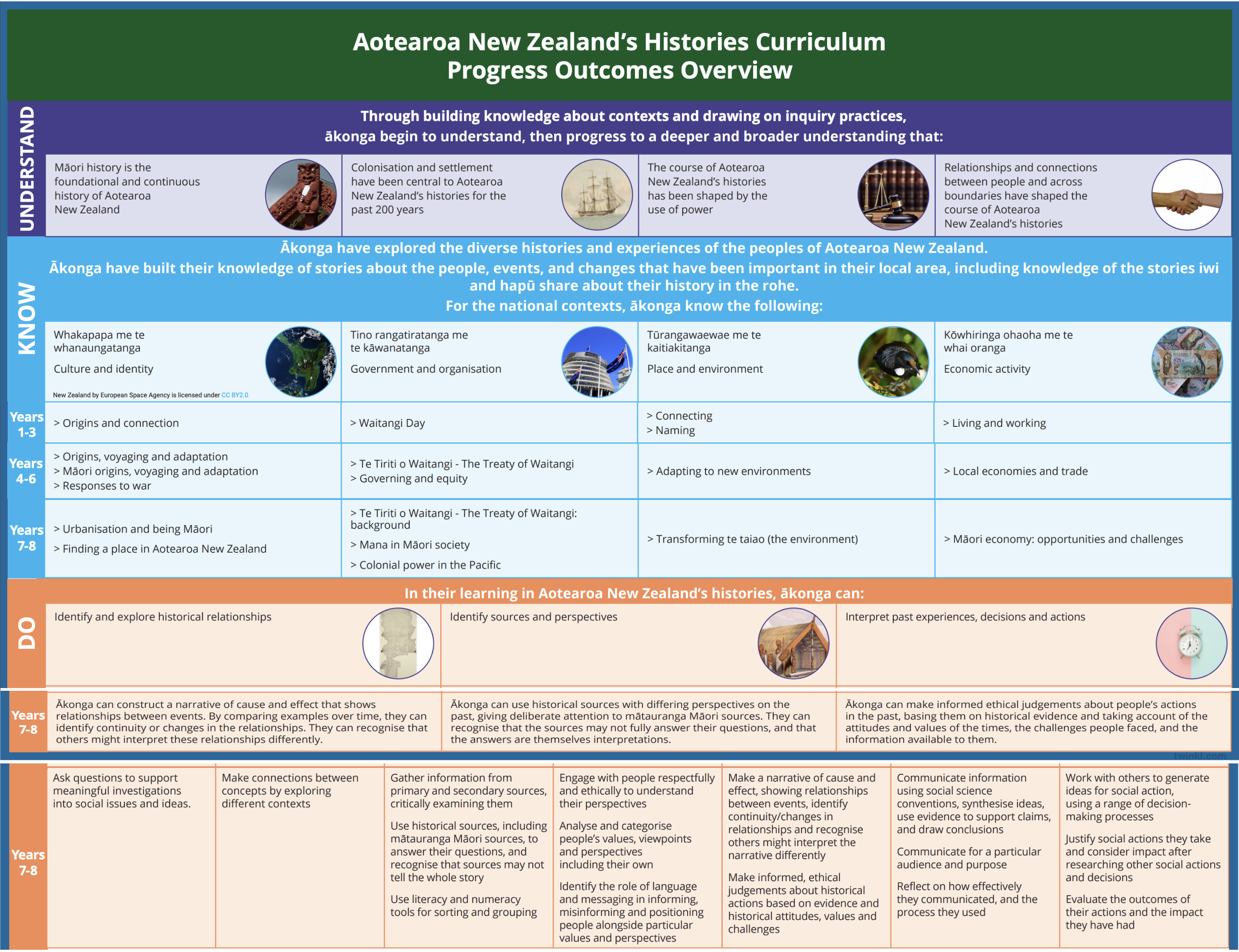7F2 Global Studies
Section outline
-
Kia ora, welcome to your Global Studies 2024 Course Page!
Ko Mrs Chamberlin toku ingoa. I will be your Global Studies teacher this year.
You can email me schamberlin@mhjc.school.nz or visit me in my class F6.
Please check MHO regularly for activities and planning. Your assessments will be linked here, at the top of the MHO page.
For Global Studies this year you will need:
- Device and a lined exercise book
- Pens, glue, ruler, colouring-in pencils and a highlighter
You need to get these ready when you are waiting in a line outside F6.
Once invited in, you need to put your bag in the bag cupboard. You then need to read and record the Date, Learning Intentions, Success Criteria & 'Do Now' activity in your exercise book.
This will be our routine and I expect not to ask you to do this, but for you to manage yourself to action this at the start of every session. 😃👍

- Device and a lined exercise book
-
EXPLORE / TŪHURA learning intentions:
Kei teo ako mātou ki: WALT...
Culture and Collective Identity: Finding a place in Aotearoa New Zealand- We are EXPLORING/FOCUSING on the experiences of Chinese and Pasifika communities in Aotearoa by identifying how a group have participated and contributed to Aotearoa’s society
- We are EXPLORING/FOCUSING on the experiences of Chinese and Pasifika communities in Aotearoa by investigating the barriers faced by the groups community in Aotearoa
- We are EXPLORING/FOCUSING on the experiences of Chinese and Pasifika communities in Aotearoa by recognising how a group have both retained and adapted their culture & identity
- We are EXPLORING/FOCUSING on the experiences of Chinese and Pasifika communities in Aotearoa by researching ways a group have remained connected to their place of origin
Kia ora! This week Miss Steel will be supporting your introduction to Global Studies '24 and your exciting Term One learning context!
Context: 'Kainga We Wae' - Ngahere Whānau, our Home!
MHJC Values: Awhinatanga/Compassion: Positive partnerships
Paearu Angitu: (Success Criteria): I can...
Hei Mahi (Activities):- Session 1: Welcome to Global Studies '24! 'Do Now:' Discuss classroom learning routines (Miss Steel's slideshow Pg's 1 to 11).
- Register to join 7F1's Google Classroom page: elqwsaa
Do Now: 'Current Events Quiz'.
- Tuesday's Waitangi Day public holiday commemorated the signing of 'Te Tiriti o Waitangi' [the Treaty of Waitangi] on 6th February, 1840. In the spirit of working towards positive partnerships, please select a paper feather to publish beautifully for our Yr 7 Ngahere Korowai art installation (using coloured pencils). The Korowai is symbolic of leadership, and includes the obligation to care for people & the environment - these principles closely align with the values we 'live & breathe' every day in Ngahere Whānau. Please write your own 'positive partnership' pledge on the back of your feather + your name.
eg. "I pledge to use kind words when speaking to my classmates to support positive partnerships."
eg. "I pledge to use positive self-talk to help me work through challenging situations eg. class work, friendships, etc."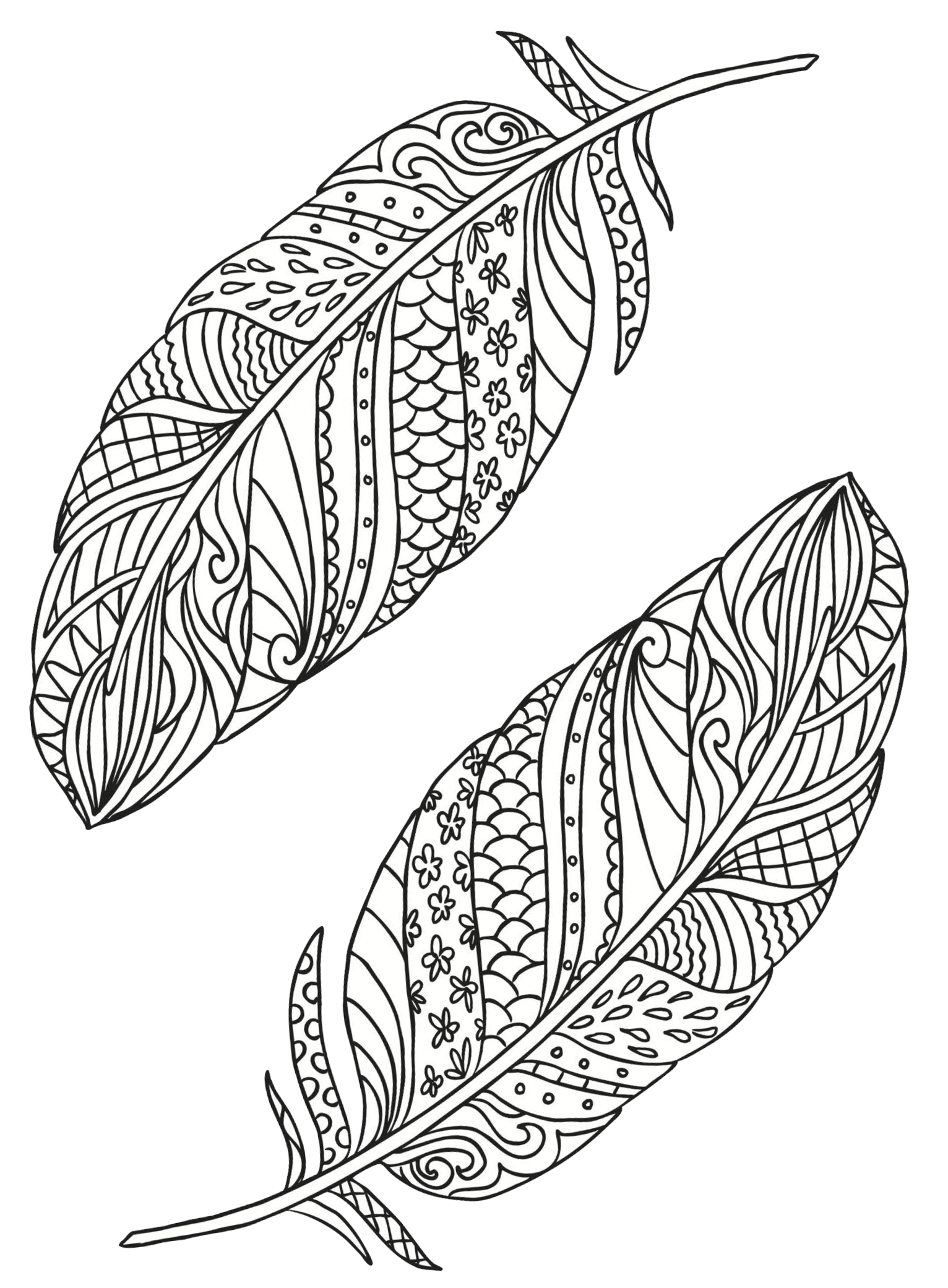
- Session 2: 'Do Now:' Record the date and draw the 'fishbone' frame into a whole page of your exercise book.
Read the school journal pdf 'Te Tiriti o Waitangi' and complete the fishbone research task - resources are on Google Classroom. Please use a ruler to draw the fishbone graphic organiser on a whole page of your Global Studies exercise book. Miss Steel will inform you whether reading is a shared whole class task, buddy or individual activity (the audio file is also on Google Classroom). Please include the keywords: 'Kāwanatanga' + 'Sovereignty' under the '3 Articles of Te Tiriti' note-taking headings.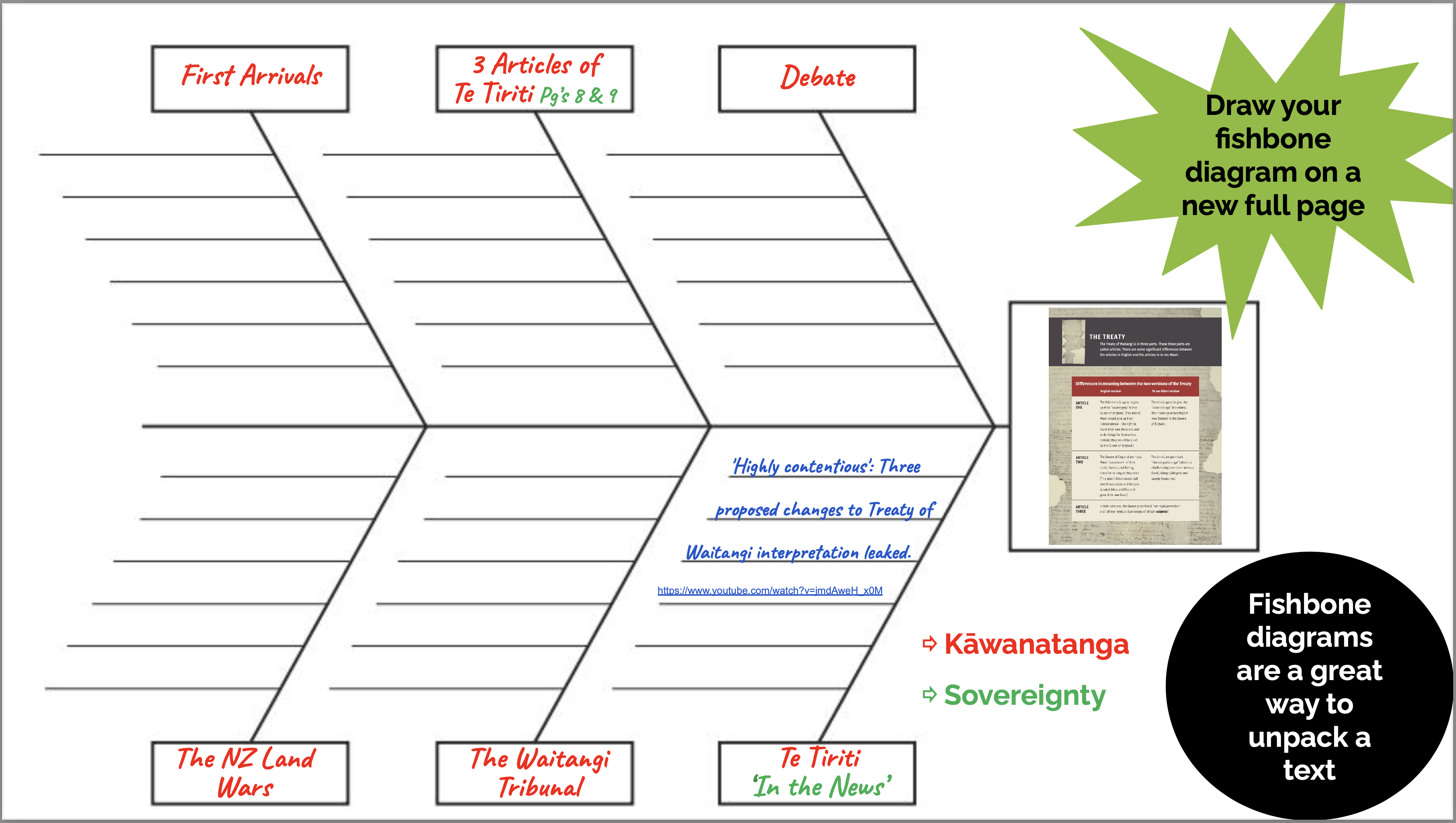
- Session 3: 'Do Now: 'Kahoot 'Treaty of Waitangi' by Whaea Katarena. Insert link here...
- Read 'Chinese New Zealanders' school journal pdf article then start the associated slideshow tasks on Google Classroom.
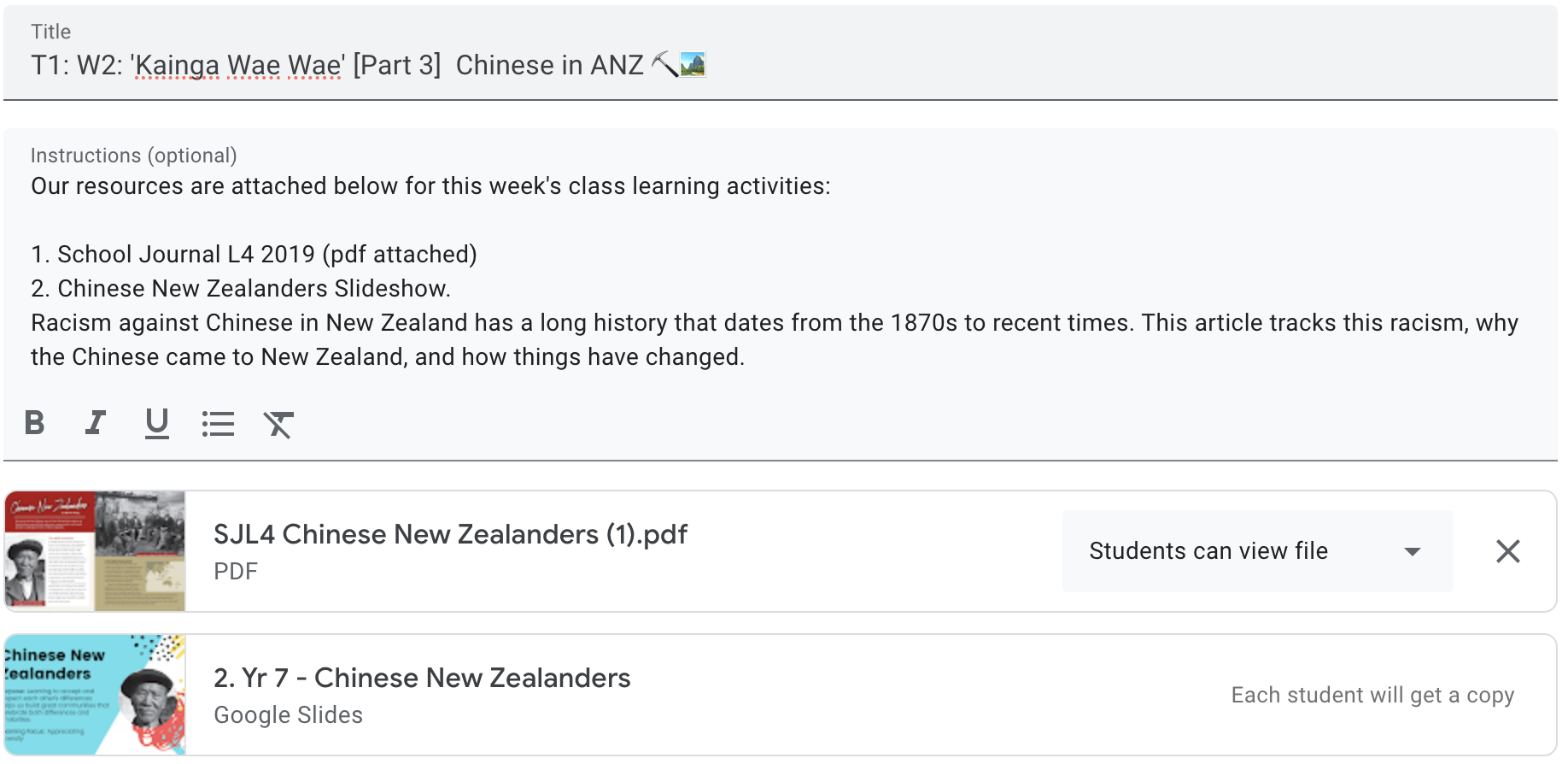
Mahi Kāinga (Homework/Further Learning):
Please finish colouring the feather for our Year 7 Korowai (cloak) for homework this week. Your feather is due to be handed in this Friday 9th February.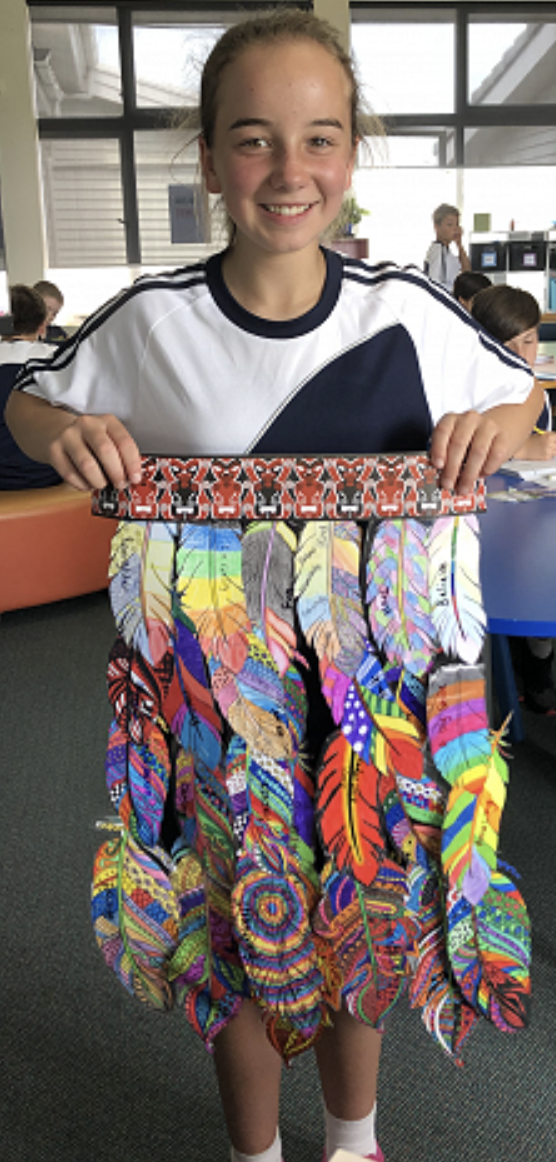
-
EXPLORE / TŪHURA learning intentions:
- We are EXPLORING Kianga Wae Wae by recognising our own identity, culture/s and values
- We are EXPLORING Kianga Wae Wae by identifying the culture and values of MHJC
- We are EXPLORING Kianga Wae Wae by investigating popular parts of Kiwi culture and how it has changed over time
- We are EXPLORING Kianga Wae Wae by researching my family history and cultural heritage
- We are EXPLORING Kianga Wae Wae by comparing how my own or another cultural has evolved or remained the same over time

Activities:
- Korowai creation - finishing colouring in and cutting out your feathers
- New Zealand geography quiz
- Identify parts of your own culture & how you celebrate it.
- Kiwiana discussion and game
- Reflection questions
- NZ mapping activity
- Weekly Quiz!
-
EXPLORE / TŪHURA learning intentions:
- We are EXPLORING Kianga Wae Wae by recognising our own identity, culture/s and values
- We are EXPLORING Kianga Wae Wae by identifying the culture and values of MHJC
- We are EXPLORING Kianga Wae Wae by investigating popular parts of Kiwi culture and how it has changed over time
- We are EXPLORING Kianga Wae Wae by researching my family history and cultural heritage
- We are EXPLORING Kianga Wae Wae by comparing how my own or another cultural has evolved or remained the same over time

Activities:
- NZ Mapping task
- Mapping activities - compass directions & grid references
-
EXPLORE / TŪHURA learning intentions:
- We are EXPLORING Kianga Wae Wae by recognising our own identity, culture/s and values
- We are EXPLORING Kianga Wae Wae by identifying the culture and values of MHJC
- We are EXPLORING Kianga Wae Wae by investigating popular parts of Kiwi culture and how it has changed over time
- We are EXPLORING Kianga Wae Wae by researching my family history and cultural heritage
- We are EXPLORING Kianga Wae Wae by comparing how my own or another cultural has evolved or remained the same over time

Activities:
- FACKTS mapping discussion
- New Zealand mapping task continued...
- Weekly quiz
- Mapping activities continued...
-
FOCUS / ARONGA learning intentions:
- We are FOCUSING on Urbanisation of Māori by identifying the scale and pace of the migration through maps and statistics
- We are FOCUSING on Urbanisation of Māori by describing the push/pull factors with the challenges Māori faced after the Second World War.
- We are FOCUSING on Urbanisation of Māori by discussing the impact of urbanisation of Māori culture/identity & communities
- We are FOCUSING on Urbanisation of Māori by analysing how Māori were excluded in urban environments (through social, financial and culture means)
- We are FOCUSING on Urbanisation of Māori by explaining how Māori sustained their culture by adapting to new ways of living (language, culture, and identity on papa kāinga)
- We are FOCUSING on Urbanisation of Māori by discussing perspectives of iwi and hapū.
Success Criteria:

Activities:
- Education Perfect - Māori Urbanisation
- Weekly quiz
- SEXY paragraph writing
-
FOCUS / ARONGA learning intentions:
- We are FOCUSING on Urbanisation of Māori by identifying the scale and pace of the migration through maps and statistics
- We are FOCUSING on Urbanisation of Māori by describing the push/pull factors with the challenges Māori faced after the Second World War.
- We are FOCUSING on Urbanisation of Māori by discussing the impact of urbanisation of Māori culture/identity & communities
- We are FOCUSING on Urbanisation of Māori by analysing how Māori were excluded in urban environments (through social, financial and culture means)
- We are FOCUSING on Urbanisation of Māori by explaining how Māori sustained their culture by adapting to new ways of living (language, culture, and identity on papa kāinga)
- We are FOCUSING on Urbanisation of Māori by discussing perspectives of iwi and hapū.
Success Criteria:

Activities:
- Weekly quiz!
- School Journal reading
- School journal questions
-
FOCUS / ARONGA learning intentions:
- We are FOCUSING on Urbanisation of Māori by identifying the scale and pace of the migration through maps and statistics
- We are FOCUSING on Urbanisation of Māori by describing the push/pull factors with the challenges Māori faced after the Second World War.
- We are FOCUSING on Urbanisation of Māori by discussing the impact of urbanisation of Māori culture/identity & communities
- We are FOCUSING on Urbanisation of Māori by analysing how Māori were excluded in urban environments (through social, financial and culture means)
- We are FOCUSING on Urbanisation of Māori by explaining how Māori sustained their culture by adapting to new ways of living (language, culture, and identity on papa kāinga)
- We are FOCUSING on Urbanisation of Māori by discussing perspectives of iwi and hapū.
Success Criteria:

Activities:
- Māori urbanisation cloze comprehension
- Māori urbanisation - mini statistic project
- Weekly Quiz!
-
EXPLORE / TŪHURA learning intentions:
- We are EXPLORING Kianga Wae Wae by recognising our own identity, culture/s and values
- We are EXPLORING Kianga Wae Wae by identifying the culture and values of MHJC
- We are EXPLORING Kianga Wae Wae by investigating popular parts of Kiwi culture and how it has changed over time
- We are EXPLORING Kianga Wae Wae by researching my family history and cultural heritage
- We are EXPLORING Kianga Wae Wae by comparing how my own or another cultural has evolved or remained the same over time

Activities:
- Country & Culture comparison worksheet
- Weekly Quiz!
-
EXPLORE / TŪHURA learning intentions:
- We are EXPLORING Kianga Wae Wae by recognising our own identity, culture/s and values
- We are EXPLORING Kianga Wae Wae by identifying the culture and values of MHJC
- We are EXPLORING Kianga Wae Wae by investigating popular parts of Kiwi culture and how it has changed over time
- We are EXPLORING Kianga Wae Wae by researching my family history and cultural heritage
- We are EXPLORING Kianga Wae Wae by comparing how my own or another cultural has evolved or remained the same over time

Activities:
- Create a poster - country & culture research!
-
EXPLORE / TŪHURA learning intentions:
- We are EXPLORING Kianga Wae Wae by recognising our own identity, culture/s and values
- We are EXPLORING Kianga Wae Wae by identifying the culture and values of MHJC
- We are EXPLORING Kianga Wae Wae by investigating popular parts of Kiwi culture and how it has changed over time
- We are EXPLORING Kianga Wae Wae by researching my family history and cultural heritage
- We are EXPLORING Kianga Wae Wae by comparing how my own or another cultural has evolved or remained the same over time

Activities:
- Continue with the poster creation - country & culture research!
- Weekly quiz!
-

Kia ora! This week we are exploring a taonga of Aotearoa - Ponmau.
EXPLORE / TŪHURA learning intentions:
- We are EXPLORING people’s values, viewpoints, and perspectives, including my own
- We are EXPLORING how language and messaging can be used to inform, to misinform, and to position people alongside particular values and perspectives.
- We are EXPLORING relationships between events and identify continuity or changes in relationships.
- We are EXPLORING people’s actions in the past based on historical evidence and taking account of the attitudes and values of the times,
the challenges people faced, and the information available to them.
Authentic Outcomes: Science Fair and ‘Taonga of Aotearoa’ weaving/print-making exhibition.
Theme: The importance of land/sustainability
Whakatauki: "Whatungarongaro te tangata, toitū te whenua."
Metaphorical: As people disappear from sight, the land remains.
Literal: This whakatauki speaks to the importance and permanence of land. While people come and go, the land remains. As humans we rely on the land. We must think long-term and see the big picture to ensure the sustainability of the land.
Paearu Angitu (Success Criteria): I can...
- Locate information in a text
- Define key terms
- Examine values, viewpoints, and perspectives
Hei Mahi (Activities):
1. Pounamu is a taonga with deep spiritual significance to Māori. Its beauty, usefulness, and cultural significance made it a highly prized resource that was traded throughout Aotearoa New Zealand. This article explores the pounamu trade from the 1770s through to the present day, discussing the impact of colonisation on the trade of pounamu and how Ngāi Tahu regained kaitiakitanga of pounamu through the Treaty settlement process.
2. In pairs, read the journal article: 'Trading Taonga: The Story of Pounamu' attached as a pdf, below.
3. Discuss the Key Terms: carving, mana, Māori economy, Ngāi Tahu, pounamu, Poutini, pūrākau, South Island, taniwha, taonga, Te Tiriti o Waitangi, trade, Treaty settlement, Waitaiki
4. In exercise books, write the short date, heading and full answers to questions #1 to #19.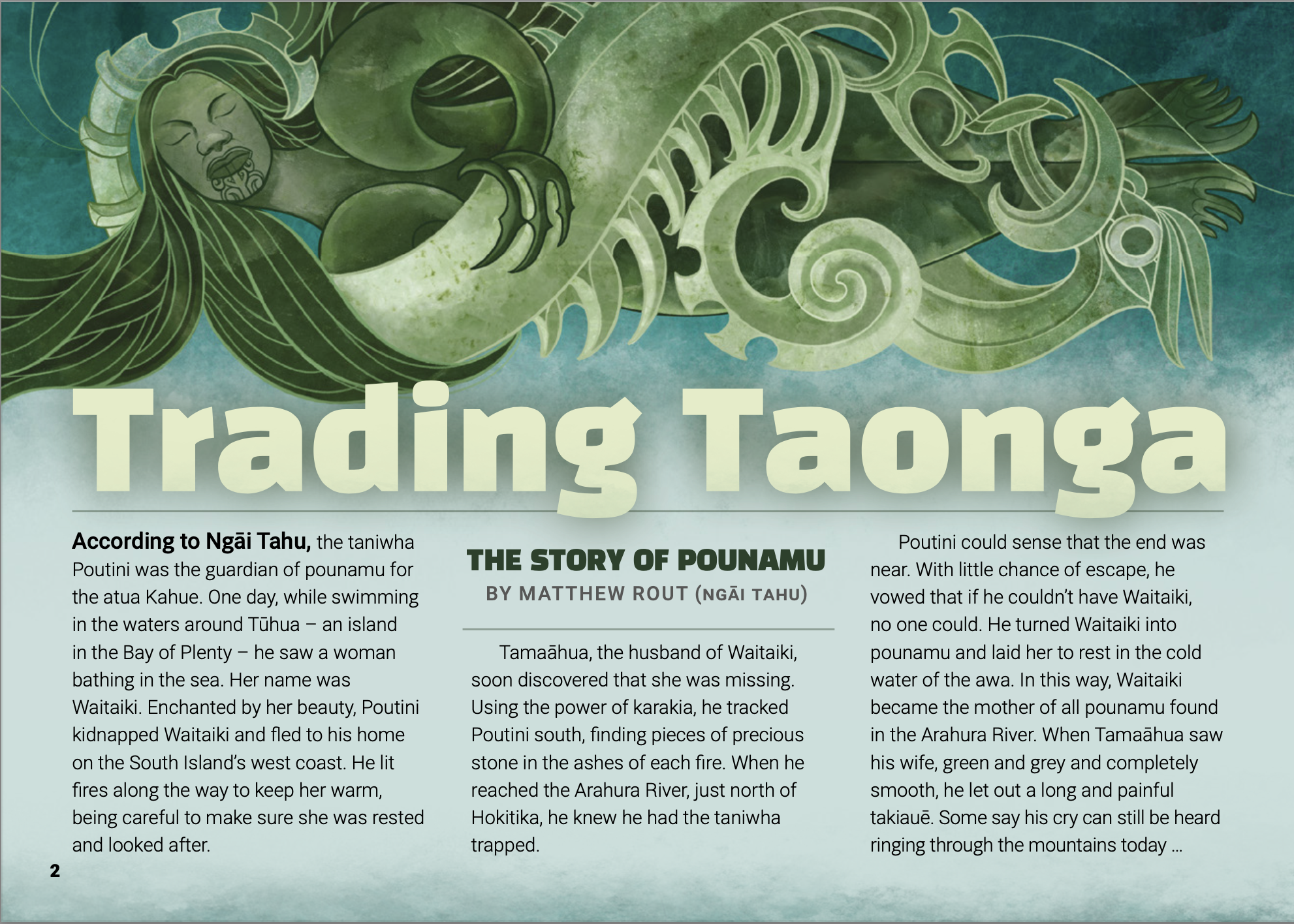
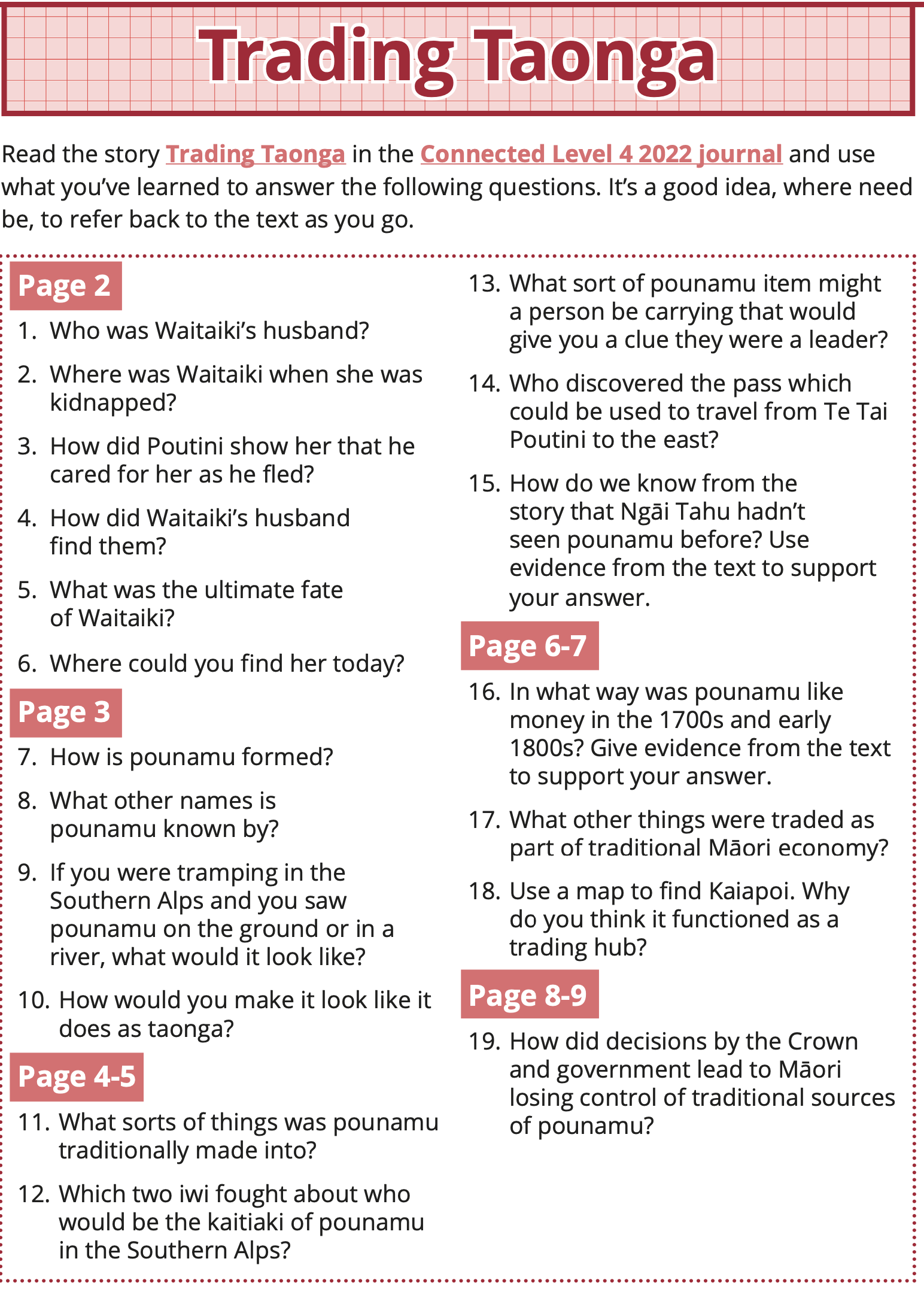
-
Kia ora! This week we continue to explore Ponmau and other taonga that were traded throughout Aotearoa New Zealand. Iwi and hapū experimented with new economic opportunities to enhance their mana. In doing so, they built extensive trading networks.
EXPLORE / TŪHURA learning intentions:
- We are EXPLORING people’s values, viewpoints, and perspectives, including my own
- We are EXPLORING how language and messaging can be used to inform, to misinform, and to position people alongside particular values and perspectives.
- We are EXPLORING relationships between events and identify continuity or changes in relationships.
- We are EXPLORING people’s actions in the past based on historical evidence and taking account of the attitudes and values of the times,
the challenges people faced, and the information available to them.
Authentic Outcomes: Science Fair and ‘Taonga of Aotearoa’ weaving/print-making exhibition.
Theme: The importance of land/sustainability
Whakatauki: "Whatungarongaro te tangata, toitū te whenua."
Metaphorical: As people disappear from sight, the land remains.
Literal: This whakatauki speaks to the importance and permanence of land. While people come and go, the land remains. As humans we rely on the land. We must think long-term and see the big picture to ensure the sustainability of the land.
Paearu Angitu (Success Criteria): I can...
- Locate information in a text
- Define key terms
- Examine values, viewpoints, and perspectives
Hei Mahi (Activities):
1. Complete Week 2's 'Current Events' quiz activity.
2. Read and view the graphic resource, 'Kohatu Stone'.
3. In your exercise book, respond thoughtfully to answer the questions, using full answers.
4. Next, complete the mapping task to show the new economic opportunities grown through extensive stone trading networks.
Remember, every map requires FACKTS! Frame, Axis, Colour, Key, Title and Scale.
5. Fast finishers: In pairs read and view the Powerpoint 'Discovering Early New Zealand'. Answer the questions in the green boxes using full answers then construct a Glossary by copying the pink terms into your exercise book .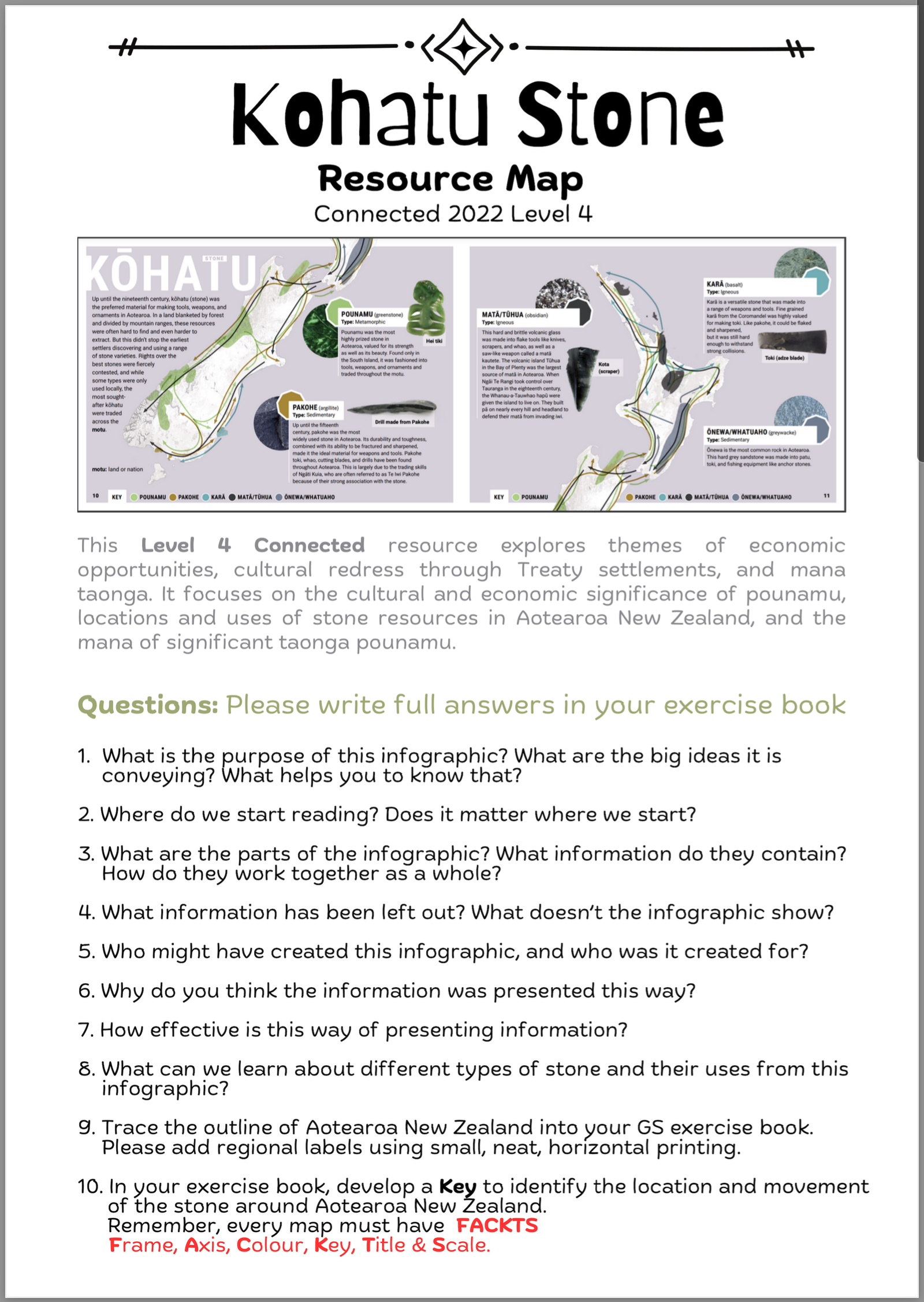

-
Kia ora! This week we are going to explore Tāmoko. Tāmoko reflects an individual's whakapapa and personal history. Tāmoko is an important part of Māori culture. In past, it was an important signifier of social rank.
EXPLORE / TŪHURA learning intentions:
- We are EXPLORING people’s values, viewpoints, and perspectives, including my own
- We are EXPLORING how language and messaging can be used to inform, to misinform, and to position people alongside particular values and perspectives.
- We are EXPLORING relationships between events and identify continuity or changes in relationships.
- We are EXPLORING people’s actions in the past based on historical evidence and taking account of the attitudes and values of the times,
the challenges people faced, and the information available to them.
Authentic Outcomes: Science Fair and ‘Taonga of Aotearoa’ weaving/print-making exhibition.
Theme: The importance of land/sustainability
Whakatauki: "Whatungarongaro te tangata, toitū te whenua."
Metaphorical: As people disappear from sight, the land remains.
Literal: This whakatauki speaks to the importance and permanence of land. While people come and go, the land remains. As humans we rely on the land. We must think long-term and see the big picture to ensure the sustainability of the land.
Paearu Angitu (Success Criteria): I can...
- Locate information in a text
- Define key terms
- Examine values, viewpoints, and perspectives
Hei Mahi (Activities):
1. Complete Week 3's 'Current Events' quiz activity.
2. We are going to create a poster/ informational infographics. We will work in pairs.
3. Read the article SJL4 Puaki.
4. Record the information about Tāmoko you got from the article. You can get more information from here: https://www.tepapa.govt.nz/discover-collections/read-watch-play/maori/tamoko-maori-tattoos-history-practice-and-meanings. Write in your books.
5. Create a blue print for your infographics.
6. Create your poster/ informational infographics. I am expecting the following:
- Five facts: past and present
-Attractive and colourful
-Drawing/pictures and words both.
-Summary of the information provided for one of the personalities mentioned in the article and their experience.Have fun! I can't wait to see some amazing work! :)
-
Kia ora! This week we are going to explore Tāmoko. Tāmoko reflects an individual's whakapapa and personal history. Tāmoko is an important part of Māori culture. In past, it was an important signifier of social rank.
EXPLORE / TŪHURA learning intentions:
- We are EXPLORING people’s values, viewpoints, and perspectives, including my own
- We are EXPLORING how language and messaging can be used to inform, to misinform, and to position people alongside particular values and perspectives.
- We are EXPLORING relationships between events and identify continuity or changes in relationships.
- We are EXPLORING people’s actions in the past based on historical evidence and taking account of the attitudes and values of the times,
the challenges people faced, and the information available to them.
Authentic Outcomes: Science Fair and ‘Taonga of Aotearoa’ weaving/print-making exhibition.
Theme: The importance of land/sustainability
Whakatauki: "Whatungarongaro te tangata, toitū te whenua."
Metaphorical: As people disappear from sight, the land remains.
Literal: This whakatauki speaks to the importance and permanence of land. While people come and go, the land remains. As humans we rely on the land. We must think long-term and see the big picture to ensure the sustainability of the land.
Paearu Angitu (Success Criteria): I can...
- Locate information in a text
- Define key terms
- Examine values, viewpoints, and perspectives
Hei Mahi (Activities):
1. Complete Week 4's 'Current Events' quiz activity.
2. We are going to create a poster/ informational infographics. We will work in pairs.
3. Create your poster/ informational infographics. I am expecting the following:
- Five facts: past and present
-Attractive and colourful
-Drawing/pictures and words both.
-Summary of the information provided for one of the personalities mentioned in the article and their experience.Have fun! I can't wait to see some amazing work! :)
-
EXPLORE / TŪHURA learning intentions:
- We are EXPLORING people’s values, viewpoints, and perspectives, including my own
- We are EXPLORING how language and messaging can be used to inform, to misinform, and to position people alongside particular values and perspectives.
- We are EXPLORING relationships between events and identify continuity or changes in relationships.
- We are EXPLORING people’s actions in the past based on historical evidence and taking account of the attitudes and values of the times,
the challenges people faced, and the information available to them.
Authentic Outcomes: Science Fair and ‘Taonga of Aotearoa’ weaving/print-making exhibition.
Theme: The importance of land/sustainability
Whakatauki: "Whatungarongaro te tangata, toitū te whenua."
Metaphorical: As people disappear from sight, the land remains.
Literal: This whakatauki speaks to the importance and permanence of land. While people come and go, the land remains. As humans we rely on the land. We must think long-term and see the big picture to ensure the sustainability of the land.
Paearu Angitu (Success Criteria): I can...
- Locate information in a text
- Define key terms
- Examine values, viewpoints, and perspectives
- Present information through picture and text.
Hei Mahi (Activities):
This week our focus is to finish our infographic posters and upload it on the website as an evidence.
1. Complete Week 4's 'Current Events' quiz activity.
2. Finish poster/ informational infographics.
3. Upload the picture on your Google Website as an evidence.Have fun! :)
-
EXPLORE / TŪHURA learning intentions:
- We are EXPLORING people’s values, viewpoints, and perspectives, including my own
- We are EXPLORING how language and messaging can be used to inform, to misinform, and to position people alongside particular values and perspectives.
- We are EXPLORING relationships between events and identify continuity or changes in relationships.
- We are EXPLORING people’s actions in the past based on historical evidence and taking account of the attitudes and values of the times,
the challenges people faced, and the information available to them.
Authentic Outcomes: Science Fair and ‘Taonga of Aotearoa’ weaving/print-making exhibition.
Theme: The importance of land/sustainability
Whakatauki: "Whatungarongaro te tangata, toitū te whenua."
Metaphorical: As people disappear from sight, the land remains.
Literal: This whakatauki speaks to the importance and permanence of land. While people come and go, the land remains. As humans we rely on the land. We must think long-term and see the big picture to ensure the sustainability of the land.
Paearu Angitu (Success Criteria): I can...
- Locate information in a text
- Define key terms
- Examine values, viewpoints, and perspectives
- Present information through picture and text.
Hei Mahi (Activities):
This week we are going to focus on another important Taonga of New Zealand - Harakeke. We will explore the history, usage, current situation and tikanga around it. To conclude this, we will learn some weaving techniques and skills. This will help us to understand and experience not only some qualities of the Harakeke but also an important part of Māori art & culture.
Session 1: Discussion and exploring the history and timeline, & GC activity
Session 2: Comprehension Activity - The History of Harakeke
Session 3: Tikanga Harakeke - Understand and Practice1. Complete Week 4's 'Current Events' quiz activity.
2. After teacher explanation and discussion, finish Google Classroom activity.
3. After classroom discussion, finish the comprehension activity.
4. Early finishers, complete Holistic report.Have fun! :)
-
EXPLORE / TŪHURA learning intentions:
- We are EXPLORING people’s values, viewpoints, and perspectives, including my own
- We are EXPLORING how language and messaging can be used to inform, to misinform, and to position people alongside particular values and perspectives.
- We are EXPLORING relationships between events and identify continuity or changes in relationships.
- We are EXPLORING people’s actions in the past based on historical evidence and taking account of the attitudes and values of the times,
the challenges people faced, and the information available to them.
Authentic Outcomes: Science Fair and ‘Taonga of Aotearoa’ weaving/print-making exhibition.
Theme: The importance of land/sustainability
Whakatauki: "Whatungarongaro te tangata, toitū te whenua."
Metaphorical: As people disappear from sight, the land remains.
Literal: This whakatauki speaks to the importance and permanence of land. While people come and go, the land remains. As humans we rely on the land. We must think long-term and see the big picture to ensure the sustainability of the land.
Paearu Angitu (Success Criteria): I can...
- Locate information in a text
- Define key terms
- Examine values, viewpoints, and perspectives
- Present information through picture and text.
Hei Mahi (Activities):
This week, we will work on our first Global Assessment. I will explain it to you before we will start working on it. This assessment is due in Term 2, Week 9. Enjoy and do your best.
1. Complete Term 2, Week 7's General Knowledge Quiz.
2. Classroom discussion.
3. After teacher's explanation, start working on your assessment.
4. Read the 'Marking Rubric' carefully.Have fun! :)
-
EXPLORE / TŪHURA learning intentions:
- We are EXPLORING people’s values, viewpoints, and perspectives, including my own
- We are EXPLORING how language and messaging can be used to inform, to misinform, and to position people alongside particular values and perspectives.
- We are EXPLORING relationships between events and identify continuity or changes in relationships.
- We are EXPLORING people’s actions in the past based on historical evidence and taking account of the attitudes and values of the times,
the challenges people faced, and the information available to them.
Authentic Outcomes: Science Fair and ‘Taonga of Aotearoa’ weaving/print-making exhibition.
Theme: The importance of land/sustainability
Whakatauki: "Whatungarongaro te tangata, toitū te whenua."
Metaphorical: As people disappear from sight, the land remains.
Literal: This whakatauki speaks to the importance and permanence of land. While people come and go, the land remains. As humans we rely on the land. We must think long-term and see the big picture to ensure the sustainability of the land.
Paearu Angitu (Success Criteria): I can...
- Locate information in a text
- Define key terms
- Examine values, viewpoints, and perspectives
- Present information through picture and text.
- Analyse and use the available resources.
Hei Mahi (Activities):
This week, we will continue working on our Global Assessment. I will explain the next step along with supporting material. Enjoy and do your best.
1. Complete Term 2, Week 7's General Knowledge Quiz.
2. Classroom discussion.
3. After teacher's explanation, start working on your assessment.
4. Read the 'Marking Rubric' carefully.Have fun! :)
-
EXPLORE / TŪHURA learning intentions:
- We are EXPLORING people’s values, viewpoints, and perspectives, including my own
- We are EXPLORING how language and messaging can be used to inform, to misinform, and to position people alongside particular values and perspectives.
- We are EXPLORING relationships between events and identify continuity or changes in relationships.
- We are EXPLORING people’s actions in the past based on historical evidence and taking account of the attitudes and values of the times,
the challenges people faced, and the information available to them.
Authentic Outcomes: Science Fair and ‘Taonga of Aotearoa’ weaving/print-making exhibition.
Theme: The importance of land/sustainability
Whakatauki: "Whatungarongaro te tangata, toitū te whenua."
Metaphorical: As people disappear from sight, the land remains.
Literal: This whakatauki speaks to the importance and permanence of land. While people come and go, the land remains. As humans we rely on the land. We must think long-term and see the big picture to ensure the sustainability of the land.
Paearu Angitu (Success Criteria): I can...
- Locate information in a text
- Define key terms
- Examine values, viewpoints, and perspectives
- Present information through picture and text.
- Analyse and use the available resources.
Hei Mahi (Activities):
This week, we will continue working on our Global Assessment and completing the panel.
1. Complete Term 2, Week 9's General Knowledge Quiz.
2. Classroom discussion.
3. After teacher's explanation, start working on your assessment.
4. Read the 'Marking Rubric' carefully.Have fun! :)
-
Opened: Monday, 10 June 2024, 8:30 AMDue: Friday, 28 June 2024, 4:30 PM
-
EXPLORE / TŪHURA learning intentions:
- We are EXPLORING people’s values, viewpoints, and perspectives, including my own
- We are EXPLORING how language and messaging can be used to inform, to misinform, and to position people alongside particular values and perspectives.
- We are EXPLORING relationships between events and identify continuity or changes in relationships.
- We are EXPLORING people’s actions in the past based on historical evidence and taking account of the attitudes and values of the times,
the challenges people faced, and the information available to them.
Authentic Outcomes: Science Fair and ‘Taonga of Aotearoa’ weaving/print-making exhibition.
Theme: The importance of land/sustainability
Whakatauki: "Whatungarongaro te tangata, toitū te whenua."
Metaphorical: As people disappear from sight, the land remains.
Literal: This whakatauki speaks to the importance and permanence of land. While people come and go, the land remains. As humans we rely on the land. We must think long-term and see the big picture to ensure the sustainability of the land.
Paearu Angitu (Success Criteria): I can...
- Locate information in a text
- Define key terms
- Examine values, viewpoints, and perspectives
- Present information through picture and text.
- Analyse and use the available resources.
Hei Mahi (Activities):
This week, we will explore and learn about Matariki and complete a related comprehension activity.
1. Complete Term 2, Week 10's General Knowledge Quiz.
2. Classroom discussion.
3. After the teacher's explanation, start your activity.Have fun! :)
-
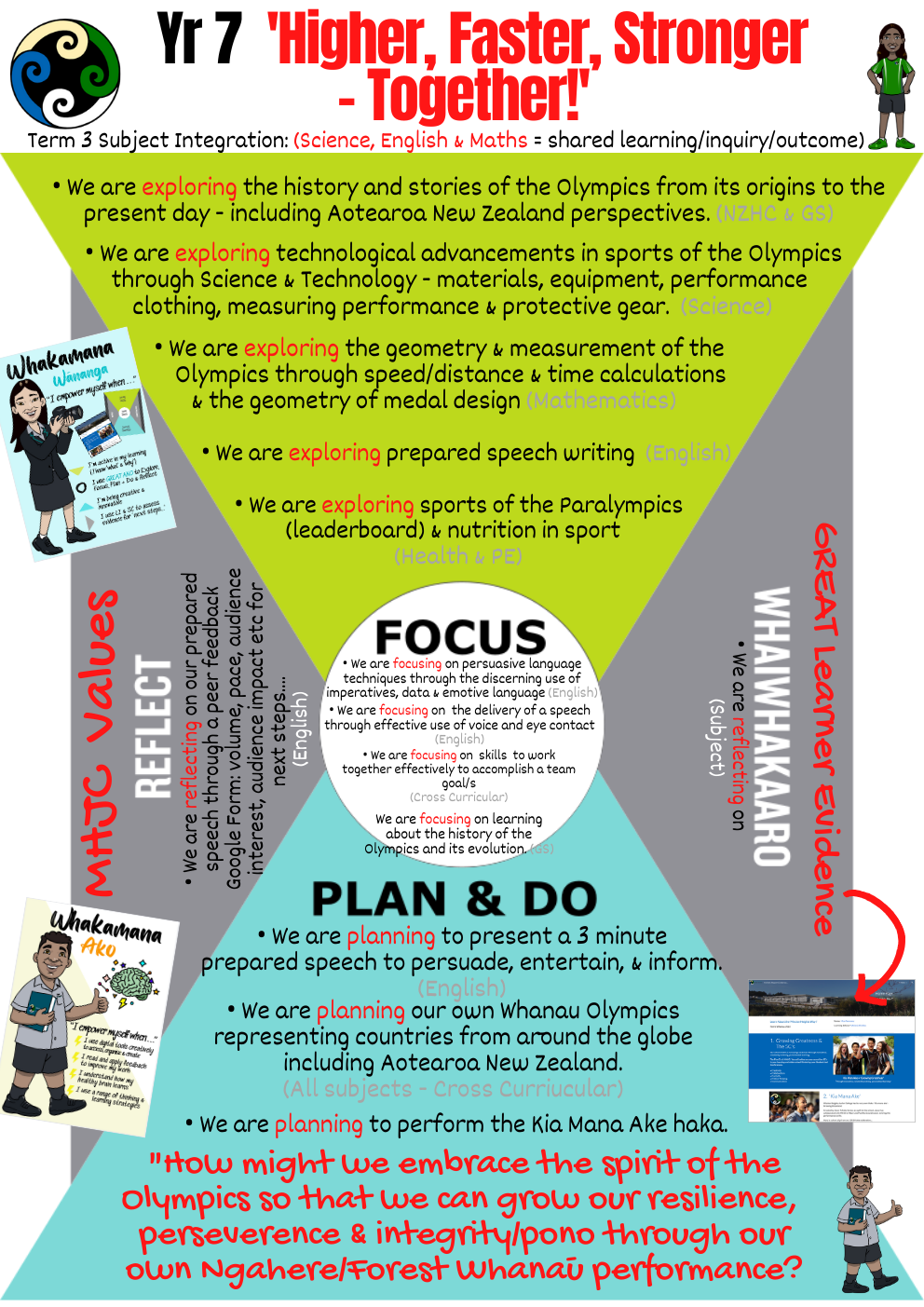
EXPLORE / TŪHURA learning intentions:
- We are EXPLORING the history of the Olympics.
- We are EXPLORING the causes and effects of the events.
- We are EXPLORING the journey of Olympics.
- We are EXPLORING the Aotearoa's perspective related to the Olympics.
Authentic Outcomes: Understanding, analysing and recording the Olympics journey.
Theme: Seek out your heart's desires.
Whakatauki: "Whāia te iti kahurangi, ki te tuohu koe me maunga teitei"
Metaphorical: Seek out your heart's desire, though if you have to relent, let it be to a lofty mountain.
Literal: This whakatauki (proverb) speaks to the importance of aiming high and being persistent and tenacious about reaching your goal/s.
Paearu Angitu (Success Criteria): I can...
- Locate information in a text.
- Define key terms.
- Identify and record the changes.
- Present information through pictures and texts.
- Analyse and use the available resources.
- Highlight that events have causes and effects.
Hei Mahi (Activities):
Kia ora everyone.
Welcome back! This term, our main theme is the Olympics. We are start with the history of the Olympics and gradually explore and learn about the Olympic journey. While exploring this, we will learn about different facts and important stories that happened during the Olympics.
Session 1: Introduction to the Olympics, Related Activity.
Session 2: History of the Olympics, Related Activity.
Session 3: Weekly Quiz, Answer the questions.
Have fun! :)
-

EXPLORE / TŪHURA learning intentions:
- We are EXPLORING the history of the Olympics.
- We are EXPLORING the causes and effects of the events.
- We are EXPLORING the journey of Olympics.
- We are EXPLORING the Aotearoa's perspective related to the Olympics.
Authentic Outcomes: Understanding, analysing and recording the Olympics journey.
Theme: Seek out your heart's desires.
Whakatauki: "Whāia te iti kahurangi, ki te tuohu koe me maunga teitei"
Metaphorical: Seek out your heart's desire, though if you have to relent, let it be to a lofty mountain.
Literal: This whakatauki (proverb) speaks to the importance of aiming high and being persistent and tenacious about reaching your goal/s.
Paearu Angitu (Success Criteria): I can...
- Locate information in a text.
- Define key terms.
- Identify and record the changes.
- Present information through pictures and texts.
- Analyse and use the available resources.
- Highlight that events have causes and effects.
Hei Mahi (Activities):
Kia ora everyone.
Welcome back! This term, our main theme is the Olympics. We are start with the history of the Olympics and gradually explore and learn about the Olympic journey. While exploring this, we will learn about different facts and important stories that happened during the Olympics.
Session 1: SLC
Session 2: History of the Modern Olympics, Related Activity on Google Classroom.
Session 3: Weekly Quiz, Exploring and learning some facts about Baron Pierre De Coubertin. Related activity.
Have fun! :)
-

EXPLORE / TŪHURA learning intentions:
- We are EXPLORING the history of the Olympics.
- We are EXPLORING the causes and effects of the events.
- We are EXPLORING the journey of Olympics.
- We are EXPLORING the Aotearoa's perspective related to the Olympics.
Authentic Outcomes: Understanding, analysing and recording the Olympics journey.
Theme: Seek out your heart's desires.
Whakatauki: "Whāia te iti kahurangi, ki te tuohu koe me maunga teitei"
Metaphorical: Seek out your heart's desire, though if you have to relent, let it be to a lofty mountain.
Literal: This whakatauki (proverb) speaks to the importance of aiming high and being persistent and tenacious about reaching your goal/s.
Paearu Angitu (Success Criteria): I can...
- Locate information in a text.
- Define key terms.
- Identify and record the changes.
- Present information through pictures and texts.
- Analyse and use the available resources.
- Highlight that events have causes and effects.
Hei Mahi (Activities):
Kia ora everyone.
Welcome back! This term, our main theme is the Olympics. We are start with the history of the Olympics and gradually explore and learn about the Olympic journey. While exploring this, we will learn about different facts and important stories that happened during the Olympics.
Session 1: Opening Ceremony
Session 2: Opening Ceremony - Task
Session 3: Weekly Quiz and Pictograms. Draw the pictures in your book, and write the name of the matching sport.
Have fun! :)
-

EXPLORE / TŪHURA learning intentions:
- We are EXPLORING the history of the Olympics.
- We are EXPLORING the causes and effects of the events.
- We are EXPLORING the journey of Olympics.
- We are EXPLORING the Aotearoa's perspective related to the Olympics.
Authentic Outcomes: Understanding, analysing and recording the Olympics journey.
Theme: Seek out your heart's desires.
Whakatauki: "Whāia te iti kahurangi, ki te tuohu koe me maunga teitei"
Metaphorical: Seek out your heart's desire, though if you have to relent, let it be to a lofty mountain.
Literal: This whakatauki (proverb) speaks to the importance of aiming high and being persistent and tenacious about reaching your goal/s.
Paearu Angitu (Success Criteria): I can...
- Locate information in a text.
- Define key terms.
- Identify and record the changes.
- Present information through pictures and texts.
- Analyse and use the available resources.
- Highlight that events have causes and effects.
Hei Mahi (Activities):
Kia ora everyone.
Welcome back! This term, our main theme is the Olympics. We are start with the history of the Olympics and gradually explore and learn about the Olympic journey. While exploring this, we will learn about different facts and important stories that happened during the Olympics.
Session 1: Olympic Mascot
Session 2:
Session 3: Weekly Quiz
Have fun! :)
-

EXPLORE / TŪHURA learning intentions:
- We are EXPLORING the history of the Olympics.
- We are EXPLORING the causes and effects of the events.
- We are EXPLORING the journey of Olympics.
- We are EXPLORING the Aotearoa's perspective related to the Olympics.
Authentic Outcomes: Understanding, analysing and recording the Olympics journey.
Theme: Seek out your heart's desires.
Whakatauki: "Whāia te iti kahurangi, ki te tuohu koe me maunga teitei"
Metaphorical: Seek out your heart's desire, though if you have to relent, let it be to a lofty mountain.
Literal: This whakatauki (proverb) speaks to the importance of aiming high and being persistent and tenacious about reaching your goal/s.
Paearu Angitu (Success Criteria): I can...
- Locate information in a text.
- Define key terms.
- Identify and record the changes.
- Present information through pictures and texts.
- Analyse and use the available resources.
- Highlight that events have causes and effects.
Hei Mahi (Activities):
Kia ora everyone.
This week, we are focusing on Olympic medals, logos, and innovations.
Session 1: Olympic logos and medals
Session 2: Olympic Innovations
Session 3: Weekly Quiz & Learner Evidence
Have fun! :)
-

EXPLORE / TŪHURA learning intentions:
- We are EXPLORING the history of the Olympics.
- We are EXPLORING the causes and effects of the events.
- We are EXPLORING the journey of Olympics.
- We are EXPLORING the Aotearoa's perspective related to the Olympics.
Authentic Outcomes: Understanding, analysing and recording the Olympics journey.
Theme: Seek out your heart's desires.
Whakatauki: "Whāia te iti kahurangi, ki te tuohu koe me maunga teitei"
Metaphorical: Seek out your heart's desire, though if you have to relent, let it be to a lofty mountain.
Literal: This whakatauki (proverb) speaks to the importance of aiming high and being persistent and tenacious about reaching your goal/s.
Paearu Angitu (Success Criteria): I can...
- Locate information in a text.
- Define key terms.
- Identify and record the changes.
- Present information through pictures and texts.
- Analyse and use the available resources.
- Highlight that events have causes and effects.
Hei Mahi (Activities):
Kia ora everyone.
This week, we are focusing on Aotearoa's rowing journey in Olympics.
Session 1: Rowing - Introduction and Task
Session 2: Assessment 2 - Introduction
Session 3: Weekly Quiz & Assessment 2
Have fun! :) -

EXPLORE / TŪHURA learning intentions:
- We are EXPLORING the history of the Olympics.
- We are EXPLORING the causes and effects of the events.
- We are EXPLORING the journey of Olympics.
- We are EXPLORING the Aotearoa's perspective related to the Olympics.
Authentic Outcomes: Understanding, analysing and recording the Olympics journey.
Theme: Seek out your heart's desires.
Whakatauki: "Whāia te iti kahurangi, ki te tuohu koe me maunga teitei"
Metaphorical: Seek out your heart's desire, though if you have to relent, let it be to a lofty mountain.
Literal: This whakatauki (proverb) speaks to the importance of aiming high and being persistent and tenacious about reaching your goal/s.
Paearu Angitu (Success Criteria): I can...
- Locate information in a text.
- Define key terms.
- Identify and record the changes.
- Present information through pictures and texts.
- Analyse and use the available resources.
- Highlight that events have causes and effects.
Hei Mahi (Activities):
Links:
Te Ara : Rowing
Kia ora everyone.
NZ History - Rowing
This week, we are focusing on working on our Assessment 2.
Session 1: Assessment 2
Session 2: Assessment 2
Session 3: Weekly Quiz & Assessment 2
Have fun! :) -

EXPLORE / TŪHURA learning intentions:
- We are EXPLORING the history of the Olympics.
- We are EXPLORING the causes and effects of the events.
- We are EXPLORING the journey of Olympics.
- We are EXPLORING the Aotearoa's perspective related to the Olympics.
Authentic Outcomes: Understanding, analysing and recording the Olympics journey.
Theme: Seek out your heart's desires.
Whakatauki: "Whāia te iti kahurangi, ki te tuohu koe me maunga teitei"
Metaphorical: Seek out your heart's desire, though if you have to relent, let it be to a lofty mountain.
Literal: This whakatauki (proverb) speaks to the importance of aiming high and being persistent and tenacious about reaching your goal/s.
Paearu Angitu (Success Criteria): I can...
- Locate information in a text.
- Define key terms.
- Identify and record the changes.
- Present information through pictures and texts.
- Analyse and use the available resources.
- Highlight that events have causes and effects.
Hei Mahi (Activities):
Links:
Te Ara : Rowing
Kia ora everyone.
NZ History - Rowing
This week, we are focusing on working on our Assessment 2.
Session 1: Assessment 2
Session 2: Assessment 2
Session 3: Weekly Quiz & Assessment 2
Have fun! :) -

EXPLORE / TŪHURA learning intentions:
- We are EXPLORING the history of the Olympics.
- We are EXPLORING the causes and effects of the events.
- We are EXPLORING the journey of Olympics.
- We are EXPLORING the Aotearoa's perspective related to the Olympics.
Authentic Outcomes: Understanding, analysing and recording the Olympics journey.
Theme: Seek out your heart's desires.
Whakatauki: "Whāia te iti kahurangi, ki te tuohu koe me maunga teitei"
Metaphorical: Seek out your heart's desire, though if you have to relent, let it be to a lofty mountain.
Literal: This whakatauki (proverb) speaks to the importance of aiming high and being persistent and tenacious about reaching your goal/s.
Paearu Angitu (Success Criteria): I can...
- Locate information in a text.
- Define key terms.
- Identify and record the changes.
- Present information through pictures and texts.
- Analyse and use the available resources.
- Highlight that events have causes and effects.
Hei Mahi (Activities):
Links:
Te Ara : Rowing
Kia ora everyone.
NZ History - Rowing
This week, we are focusing on working on our Assessment 2.
Session 1: Assessment 2
Session 2: Assessment 2
Session 3: Weekly Quiz & Assessment 2
Have fun! :)-
Opened: Thursday, 29 August 2024, 11:00 AMDue: Friday, 20 September 2024, 4:30 PM
-

EXPLORE / TŪHURA learning intentions:
- We are EXPLORING the history of the Olympics.
- We are EXPLORING the causes and effects of the events.
- We are EXPLORING the journey of Olympics.
- We are EXPLORING the Aotearoa's perspective related to the Olympics.
Authentic Outcomes: Understanding, analysing and recording the Olympics journey.
Theme: Seek out your heart's desires.
Whakatauki: "Whāia te iti kahurangi, ki te tuohu koe me maunga teitei"
Metaphorical: Seek out your heart's desire, though if you have to relent, let it be to a lofty mountain.
Literal: This whakatauki (proverb) speaks to the importance of aiming high and being persistent and tenacious about reaching your goal/s.
Paearu Angitu (Success Criteria): I can...
- Locate information in a text.
- Define key terms.
- Identify and record the changes.
- Present information through pictures and texts.
- Analyse and use the available resources.
- Highlight that events have causes and effects.
Hei Mahi (Activities):
Session 1: All around the world - Olympic History (Highlight the countries)
Link: World Map
Session 2: Focus on the flag
Session 3: Weekly & Kahoot Quiz
Have fun! :) -

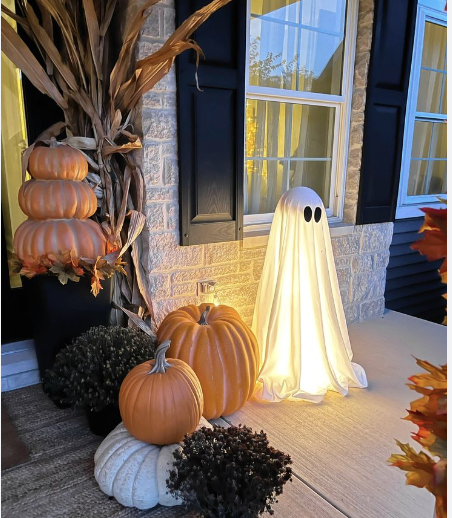

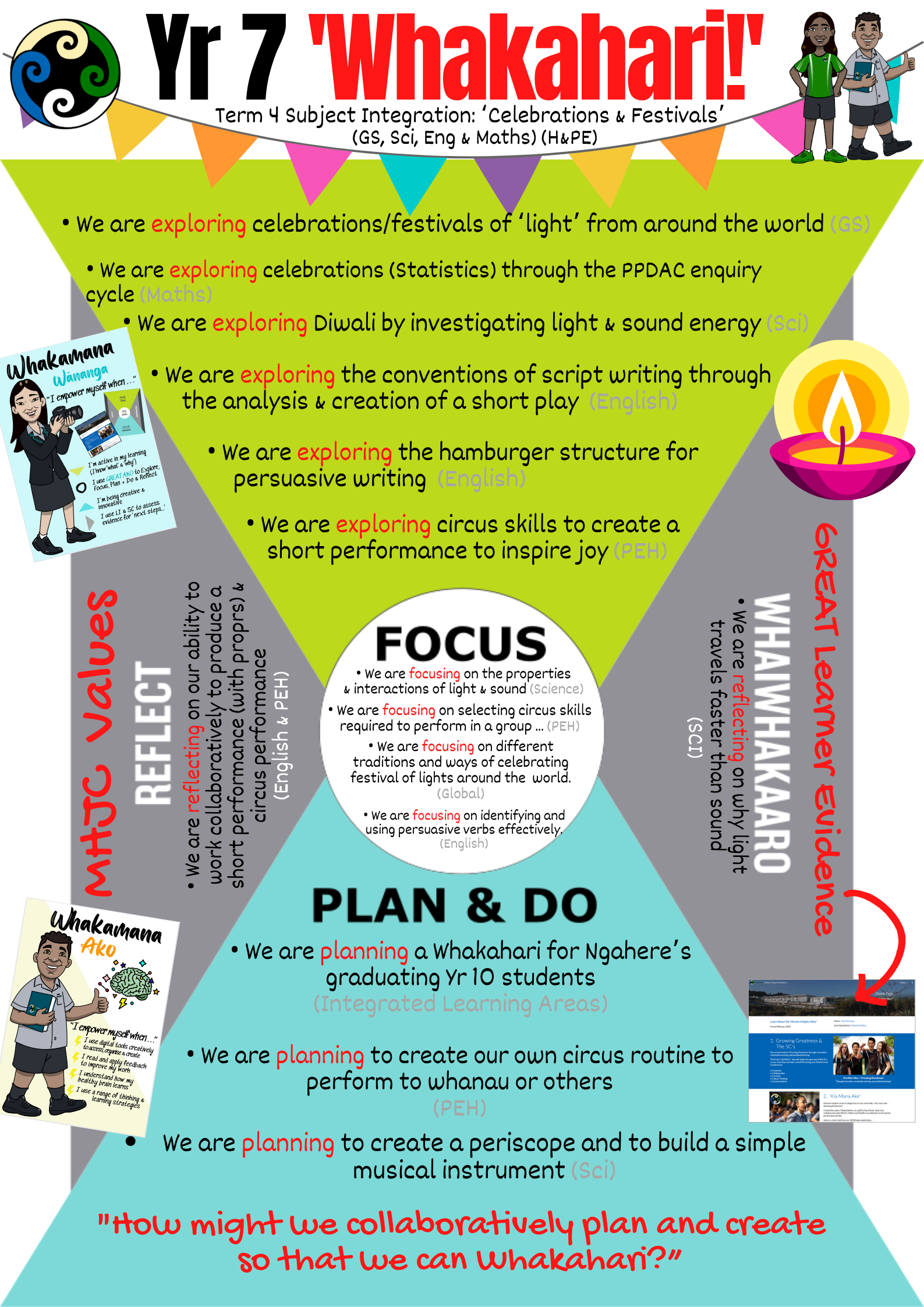
Theme: Although it is small it is a treasure
Whakatauki: "Ahakoa he iti he pounamu"
Metaphorical: Although it is small, it is greenstone (precious)
Literal: This whakatauki (proverb) speaks to a humble way of delivering a small gift. Greenstone (jade) is an extremely useful commodity which is considered very precious, so although you may not be presenting greenstone, the word pounamu stands as a metaphor for something precious or a treasure from the heart.Learning Intention:- We are EXPLORING the festival of lights
- We are EXPLORING different traditions around the world
- We are LEARNING about different cultures, values, beliefs and practices about the festival of lights
Success Criteria: I can.... - Locate information in a text
- Define key terms
- Present information through pictures and text
- Analyse and use the available resources
- Highlight differences between cultures, traditions and ways of celebrating the same festivals
Activities:
Session 1: Halloween - History
Session 2: Halloween - Different Countries, Different Traditions
Session 3: Weekly quiz & Halloween - Different Countries, Different Traditions - Task 2 -




Theme: Although it is small it is a treasure
Whakatauki: "Ahakoa he iti he pounamu"
Metaphorical: Although it is small, it is greenstone (precious)
Literal: This whakatauki (proverb) speaks to a humble way of delivering a small gift. Greenstone (jade) is an extremely useful commodity which is considered very precious, so although you may not be presenting greenstone, the word pounamu stands as a metaphor for something precious or a treasure from the heart.Learning Intention:- We are EXPLORING the festival of lights
- We are EXPLORING different traditions around the world
- We are LEARNING about different cultures, values, beliefs and practices about the festival of lights
Success Criteria: I can.... - Locate information in a text
- Define key terms
- Present information through pictures and text
- Analyse and use the available resources
- Highlight differences between cultures, traditions and ways of celebrating the same festivals
Activities:
Session 1: Halloween - Different COuntries, Different Traditions - Continue with Task 2
Session 2: Weekly Quiz & Halloween - Different Countries, Different Traditions - Presentation
Session 3: TOD -




Theme: Although it is small it is a treasure
Whakatauki: "Ahakoa he iti he pounamu"
Metaphorical: Although it is small, it is greenstone (precious)
Literal: This whakatauki (proverb) speaks to a humble way of delivering a small gift. Greenstone (jade) is an extremely useful commodity which is considered very precious, so although you may not be presenting greenstone, the word pounamu stands as a metaphor for something precious or a treasure from the heart.Learning Intention:- We are EXPLORING the festival of lights
- We are EXPLORING different traditions around the world
- We are LEARNING about different cultures, values, beliefs and practices about the festival of lights
Success Criteria: I can.... - Locate information in a text
- Define key terms
- Present information through pictures and text
- Analyse and use the available resources
- Highlight differences between cultures, traditions and ways of celebrating the same festivals
Activities:
Session 1: Halloween - Different Countries, Different Traditions - Continue with Presentation
Session 2: Weekly Quiz & History of Diwali
Session 3: Athletics Day -




Theme: Although it is small it is a treasure
Whakatauki: "Ahakoa he iti he pounamu"
Metaphorical: Although it is small, it is greenstone (precious)
Literal: This whakatauki (proverb) speaks to a humble way of delivering a small gift. Greenstone (jade) is an extremely useful commodity which is considered very precious, so although you may not be presenting greenstone, the word pounamu stands as a metaphor for something precious or a treasure from the heart.Learning Intention:- We are EXPLORING the festival of lights
- We are EXPLORING different traditions around the world
- We are LEARNING about different cultures, values, beliefs and practices about the festival of lights
Success Criteria: I can.... - Locate information in a text
- Define key terms
- Present information through pictures and text
- Analyse and use the available resources
- Highlight differences between cultures, traditions and ways of celebrating the same festivals
Activities:
Session 1: Diwali - Activity
Session 2: Rangoli Activity
Session 3: Quiz, Diwali - Different Stories, Different Traditions -




Theme: Although it is small it is a treasure
Whakatauki: "Ahakoa he iti he pounamu"
Metaphorical: Although it is small, it is greenstone (precious)
Literal: This whakatauki (proverb) speaks to a humble way of delivering a small gift. Greenstone (jade) is an extremely useful commodity which is considered very precious, so although you may not be presenting greenstone, the word pounamu stands as a metaphor for something precious or a treasure from the heart.Learning Intention:- We are EXPLORING the festival of lights
- We are EXPLORING different traditions around the world
- We are LEARNING about different cultures, values, beliefs and practices about the festival of lights
Success Criteria: I can.... - Locate information in a text
- Define key terms
- Present information through pictures and text
- Analyse and use the available resources
- Highlight differences between cultures, traditions and ways of celebrating the same festivals
Activities:
Session 1: Diwali Quiz & Christmas - During the Middle Ages, Kiwiana Christmas Crossword
Session 2: Christmas Timeline & Activity - Complete Crossword
Session 3: Quiz, Create the Timeline -




Theme: Although it is small it is a treasure
Whakatauki: "Ahakoa he iti he pounamu"
Metaphorical: Although it is small, it is greenstone (precious)
Literal: This whakatauki (proverb) speaks to a humble way of delivering a small gift. Greenstone (jade) is an extremely useful commodity which is considered very precious, so although you may not be presenting greenstone, the word pounamu stands as a metaphor for something precious or a treasure from the heart.Learning Intention:- We are EXPLORING the festival of lights
- We are EXPLORING different traditions around the world
- We are LEARNING about different cultures, values, beliefs and practices about the festival of lights
Success Criteria: I can.... - Locate information in a text
- Define key terms
- Present information through pictures and text
- Analyse and use the available resources
- Highlight differences between cultures, traditions and ways of celebrating the same festivals
Activities:
Session 1: The Christmas Truce - Introduction & Task
Session 2: The Christmas Truce - Task Continue
Session 3: Quiz, Complete the Timeline -




Theme: Although it is small it is a treasure
Whakatauki: "Ahakoa he iti he pounamu"
Metaphorical: Although it is small, it is greenstone (precious)
Literal: This whakatauki (proverb) speaks to a humble way of delivering a small gift. Greenstone (jade) is an extremely useful commodity which is considered very precious, so although you may not be presenting greenstone, the word pounamu stands as a metaphor for something precious or a treasure from the heart.Learning Intention:- We are EXPLORING the festival of lights
- We are EXPLORING different traditions around the world
- We are LEARNING about different cultures, values, beliefs and practices about the festival of lights
Success Criteria: I can.... - Locate information in a text
- Define key terms
- Present information through pictures and text
- Analyse and use the available resources
- Highlight differences between cultures, traditions and ways of celebrating the same festivals
Activities:
Session 1: Christmas - Different Countries, Different Traditions
Session 2: Create slideshow - Different Countries, Different Traditions
Session 3: Quiz, Complete the slideshow -




Theme: Although it is small it is a treasure
Whakatauki: "Ahakoa he iti he pounamu"
Metaphorical: Although it is small, it is greenstone (precious)
Literal: This whakatauki (proverb) speaks to a humble way of delivering a small gift. Greenstone (jade) is an extremely useful commodity which is considered very precious, so although you may not be presenting greenstone, the word pounamu stands as a metaphor for something precious or a treasure from the heart.Learning Intention:- We are EXPLORING the festival of lights
- We are EXPLORING different traditions around the world
- We are LEARNING about different cultures, values, beliefs and practices about the festival of lights
Success Criteria: I can.... - Locate information in a text
- Define key terms
- Present information through pictures and text
- Analyse and use the available resources
- Highlight differences between cultures, traditions and ways of celebrating the same festivals
Activities:
Session 1: Santa Show
Session 2: Slideshow - Different Countries, Different Traditions - Present
Session 3: EOY Trip -




Theme: Although it is small it is a treasure
Whakatauki: "Ahakoa he iti he pounamu"
Metaphorical: Although it is small, it is greenstone (precious)
Literal: This whakatauki (proverb) speaks to a humble way of delivering a small gift. Greenstone (jade) is an extremely useful commodity which is considered very precious, so although you may not be presenting greenstone, the word pounamu stands as a metaphor for something precious or a treasure from the heart.Learning Intention:- We are EXPLORING the festival of lights
- We are EXPLORING different traditions around the world
- We are LEARNING about different cultures, values, beliefs and practices about the festival of lights
Success Criteria: I can.... - Locate information in a text
- Define key terms
- Present information through pictures and text
- Analyse and use the available resources
- Highlight differences between cultures, traditions and ways of celebrating the same festivals
Activities:
Session 1: Christmas - Different Countries, Different Traditions - Slideshow Presentation
Session 2: Slideshow Presentation - Continue
Session 3: Prize Giving

